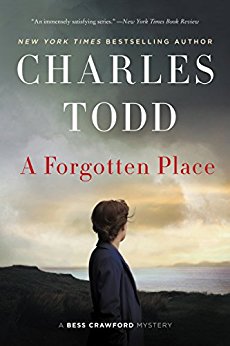 A Forgotten Place (Bess Crawford, #10) by Charles Todd
A Forgotten Place (Bess Crawford, #10) by Charles Todd Format: eARC
Source: supplied by publisher via Edelweiss
Formats available: hardcover, large print, ebook, audiobook
Genres: historical mystery
Series: Bess Crawford #10
Pages: 368
Published by William Morrow on September 18, 2018
Purchasing Info: Author's Website, Publisher's Website, Amazon, Barnes & Noble, Kobo, Bookshop.org
Goodreads
Though the Great War has ended, Bess Crawford finds herself caught in deadly circumstances on a remote Welsh headland in this tenth entry from the acclaimed New York Times bestselling author.
The fighting has ended, the Armistice signed, but the war has left wounds that are still agonizingly raw. Battlefield Nurse Bess Crawford has been assigned to a clinic for amputees, and the Welsh patients worry her. She does her best to help them, but it’s clear that they have nothing to go home to, in a valley where only the fit can work in the coal pits. When they are released, she fears that peace will do what war couldn’t—take their lives.
Their officer, Captain Williams, writes to describe their despair, and his own at trying to save his men. Bess feels compelled to look into their situation, but the Army and the clinic can do nothing. Requesting leave, she quietly travels to Wales, and that bleak coal mining village, but she is too late.
Captain Williams’ sister tells Bess he has left the valley. Bess is afraid he intends to kill himself. She follows him to an isolated, storm-battered peninsula—a harsh and forgotten place where secrets and death go hand in hand. Deserted by her frightened driver, Bess is stranded among strangers suspicious of outsiders. She quickly discovers these villagers are hiding something, and she’s learned too much to be allowed to leave. What’s more, no one in England knows where she is.
Why is there no Constable out here? And who is the mysterious Ellen? Captain Williams and his brother’s widow are her only allies, and Bess must take care not to put them at risk as she tries to find answers. But there is a murderer here who is driven to kill again and again. And the next person in his sights is Simon Brandon, searching for Bess and unaware of his danger. . . .
My Review:
This tenth story in the Bess Crawford series takes place in December 1918. The war is over, but the peace hasn’t really begun. The fighting officially ended at 11:11 am on November 11, 1918 with the signing of the Armistice. This is the day we now celebrate as Veterans Day in the U.S. and Remembrance Day in the U.K and the Commonwealth.
Bess Crawford served as a combat nurse during the war. Her service has not yet ended. While a significant part of a generation died on the battlefields, there were also many who came home missing significant pieces of themselves, and not all of those missing pieces were physical.
The war changed all who were a part of it, including Bess herself. Today we might say that she had post-traumatic stress disorder – along with many of the now ex-soldiers.
With the end of the war, the field hospitals are closing down, and the base hospitals are shrinking by the day. All the able-bodied are sent home – to a country that does not have nearly enough jobs for all of them.
Those who are still in hospital are the ones more severely wounded, still recovering as best as the medical science of the time permitted, from the loss of limbs or disfiguring wounds or both.
That’s where Bess comes in, as she becomes involved with a Welsh regiment that was wounded during the last of the fighting. A regiment formed in the coal counties of Wales, where every able-bodied man works in the mines. But the men under her care are no longer able-bodied, missing at least one limb if not more. They are alive, but have no lives to return to.
In the valleys, the only work is in the mines, and it is work they are no longer physically able to perform. They will be burdens to their families – if those families are willing to take them back. Bess does her best to help them prepare both mentally and physically for what is in front of them, but she is worried, and rightfully so, that any preparation is in vain.
So she takes it into her own hands (as she has so often during the course of the series) to follow up with this group of soldiers that has touched her heart and ignited her fears of what will happen to those irrevocably changed by the war after their war is over.
And finds herself stranded, alone and without allies, isolated in a remote Welsh village and caught between a horrifying secret and escalating evil.
All she can do is try to survive, until help comes. If that help can find her in time.
Escape Rating B: The second half of this story is a taut thriller, but the first half moves slowly, as time seems to do out in the remote Welsh villages on the Gower Peninsula.
Once Bess decides to check up on Captain Williams and his regiment, she finds herself traveling laboriously and ponderously from one tiny and remote place to the next. Once she catches up to him, she has discovered that he is the final survivor of his regiment.
That he and his men had sacrificed themselves for their country – but their country had nothing for them now that the war was over, is heartbreaking. But the trouble that finds Bess is not related to any war service – or at least not exactly.
There is a terrible secret hidden in this remote village. A secret that has caused the villagers to close ranks against any outsiders. There is no access to the place except by an uncertain arrangement for hire cars from not-so-nearby Swansea. There is no post office, no telephone exchange, no constable, no doctor. No one from the outside seems to be permitted. Captain Williams, helping his sister-in-law with her farm, is resented and reviled at every turn. Bess faces intense hostility from the second she arrives.
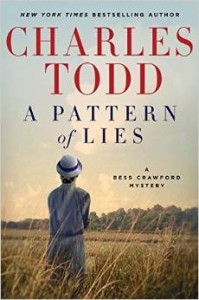 The atmosphere of this particular story will remind series readers of an earlier story, A Pattern of Lies. There is both that same sense of human nature twisted and corrupted, and the same atmosphere of almost Gothic horror.
The atmosphere of this particular story will remind series readers of an earlier story, A Pattern of Lies. There is both that same sense of human nature twisted and corrupted, and the same atmosphere of almost Gothic horror.
Bess’ forced sojourn in this tiny place with its close-mouthed and close-minded inhabitants all hunkered around the protection of their dark secret drags on a bit for the reader, possibly in sympathy with Bess and her enforced vacation from her vocation. She does her best to be of use in the household that has been forced to guest her, but it isn’t easy for her and this part of the story isn’t easy for the reader.
Things speed up, as they often do in this series, when Simon Brandon arrives to spring Bess from the trap she has gotten herself stuck in. But also as often happens in the series, Bess refuses to leave until she has solved all of the riddles – even the ones that no one wants solved.
This series has followed the progress of the war, through Bess’ perspective as a combat nurse. Part of what we see in this particular story has a great deal to do with the way that the veterans of the trenches were treated after the war ended – which was mostly abominable. I also find myself wondering whether some of Bess’ concern about the fate of this regiment now that the war was over would have reflected her own unconscious concerns about what happens to her after her war is over – as it nearly is.
As much as I don’t want this series to end, I can’t help but wonder what Bess’ post-war life will be. I hope that we get to find out.

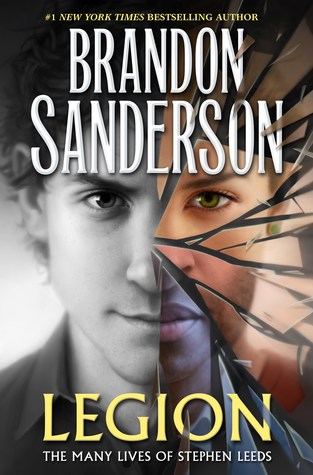 Legion: The Many Lives of Stephen Leeds (Legion, #1-3) by
Legion: The Many Lives of Stephen Leeds (Legion, #1-3) by 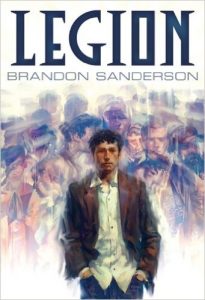 I’ve already read (actually had read to me) the first two
I’ve already read (actually had read to me) the first two 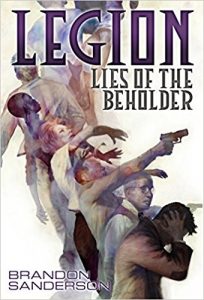 As Lies of the Beholder opens, he’s losing his aspects. Some of them just leave, but some of them go insane and kill some of the others. It feels like he’s losing bits of himself – only because he is.
As Lies of the Beholder opens, he’s losing his aspects. Some of them just leave, but some of them go insane and kill some of the others. It feels like he’s losing bits of himself – only because he is.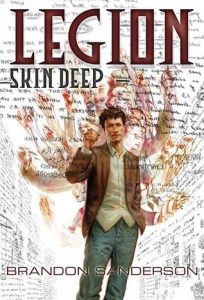 But where the other two stories were both interesting cases that Leeds’ has to solve, they were also stories about him coping with the world in a way that was comfortable for him but didn’t make him grow. Looking back, in those stories he is so comfortable with the life that he has arranged for himself that he doesn’t need to grow or change. While he doesn’t completely love his life as it is, it has certainly become comfortable and easy for him.
But where the other two stories were both interesting cases that Leeds’ has to solve, they were also stories about him coping with the world in a way that was comfortable for him but didn’t make him grow. Looking back, in those stories he is so comfortable with the life that he has arranged for himself that he doesn’t need to grow or change. While he doesn’t completely love his life as it is, it has certainly become comfortable and easy for him. The Grey Bastards (The Lot Lands, #1) by
The Grey Bastards (The Lot Lands, #1) by  The Impossible Girl by
The Impossible Girl by 

 Current Giveaways:
Current Giveaways: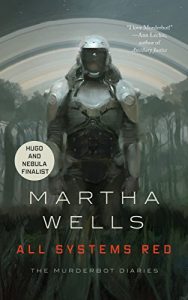 Blog Recap:
Blog Recap: Coming Next Week:
Coming Next Week:











 A Notorious Vow (The Four Hundred, #3) by
A Notorious Vow (The Four Hundred, #3) by  Although the stories all take place within the same place and time, and even though our protagonists do meet the Hatchers (the h/h of the first book,
Although the stories all take place within the same place and time, and even though our protagonists do meet the Hatchers (the h/h of the first book,  Escape Rating B+: There were several elements that made A Notorious Vow interesting in unusual ways as well as a lot of fun to read. I got sucked right in and didn’t get out until I finished – more or less in one go.
Escape Rating B+: There were several elements that made A Notorious Vow interesting in unusual ways as well as a lot of fun to read. I got sucked right in and didn’t get out until I finished – more or less in one go.

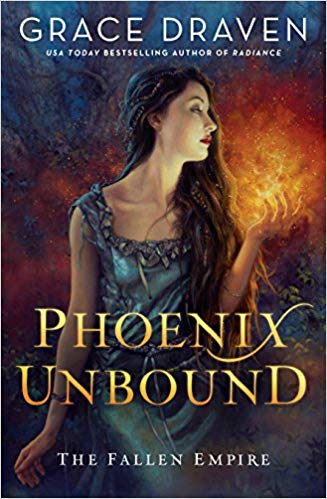 Phoenix Unbound (Fallen Empire, #1) by
Phoenix Unbound (Fallen Empire, #1) by 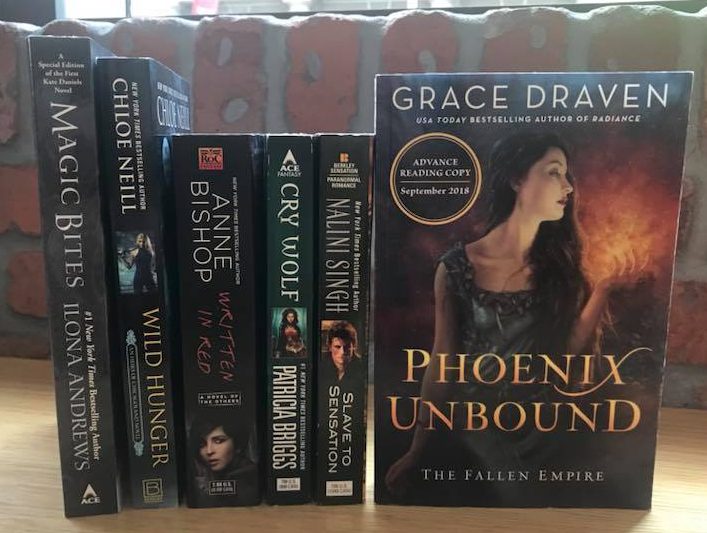
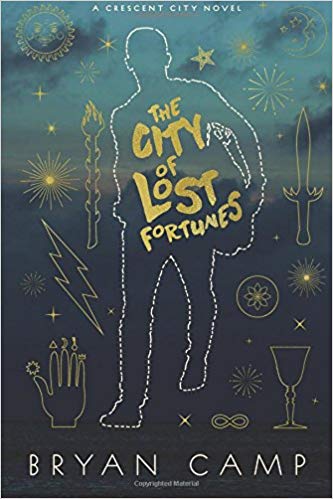 The City of Lost Fortunes (Crescent City #1) by
The City of Lost Fortunes (Crescent City #1) by 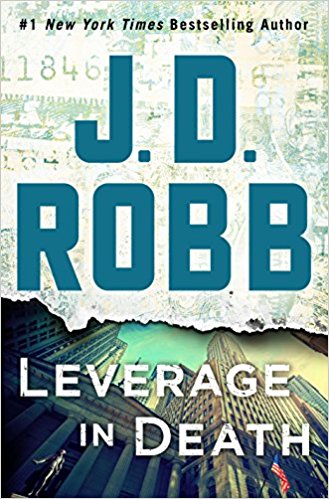 Leverage in Death (In Death, #47) by
Leverage in Death (In Death, #47) by 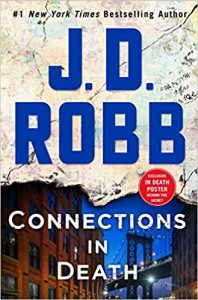 The personal stuff works its way around and through this multiple murder case. I say personal, but it all goes back to the Icove case from
The personal stuff works its way around and through this multiple murder case. I say personal, but it all goes back to the Icove case from